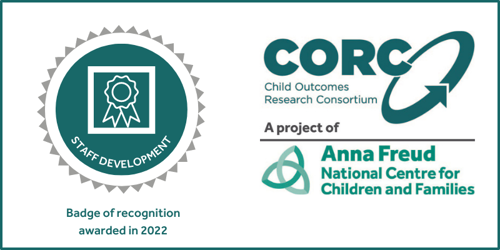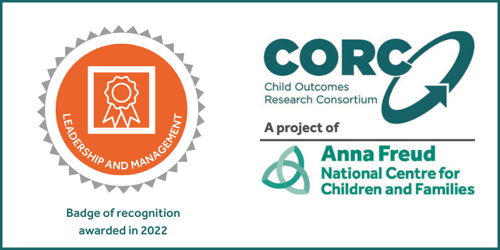Rise is a family of NHS-led services providing emotional wellbeing and mental health services for children and young people in Coventry and Warwickshire.
Embedding routine outcome monitoring (ROM) into services is a challenging task that stalled for many mental health services during the pandemic. CORC’s Best Practice Framework is a long-standing tool to help services reflect on and plan their processes for embedding ROM, ultimately to improve services for children and young people. Via the Best Practise Framework, services can also be recognised for the progress they have made and their achievements in implementing ROM.
In 2022, we tested out our new way of recognising good practice with Rise and they were recently awarded CORC Badges of Recognition in two of four domains (of the Best Practise Framework). This recognised their success in embedding ROM through staff development and leadership and management, supported by their CORC Regional Officer, Lee Atkins.


As a newer member of the CORC team, it was interesting to hear Michelle Rudd and Ellis Joyce share the highlights of their journey at the CORC forum in November.
The service journey
Rise began the process of reviewing and improving the implementation of ROM across all associated services and teams back in 2018. As a member of CORC, this is when their Regional Officer introduced Rise to CORC’s Best Practice Framework. Supported by their Regional Officer, Rise used this framework as a guide to their improvement journey, rating themselves across the four domains of the framework and implementing the CORC Practice and Attitudes staff survey at two time points, first in 2020 and again in 2022. This survey is designed to give service leads better understanding of the views and current practice of staff around the use of outcome and feedback measures. At both survey timepoints, the Regional Officer was able to take the results of the staff survey, analyse the data and produce a detailed report back to Rise, including suggestions for actions and improvements as a result of the findings.
Rise started their improvement journey by getting the ‘pre-work done’, which meant preparing the infrastructure for the clinical implementation of ROM. Part of this process was preparing a common patient note-taking system for each organisation within the Rise umbrella to use. Once suitable outcome measures were identified, these were added in an intuitive way to the system for clinicians to use.
An Outcomes Overview Group was also established - including clinical and operations leads, corporate enablers, communications colleagues, voluntary sector organisation representatives and a project manager - to support the gathering of evidence for accreditation and create an action plan for embedding ROM.
Embedding ROM successfully into a service requires a big culture change, and Rise achieved this by promoting them in all aspects of the service, from staff training, to supervision, the treatment pathway, creating ‘ROMs Champions’ and using the data in strategic discussion with commissioners.
ROMs Champions
A large part of Rise’s success in their staff development was down to their ROMs Champions, who were selected from different teams to create and facilitate ROM training, support day to day enquiries for ROM, support team discussions and offer drop-in sessions.
The CORC Practice and Attitudes staff survey highlighted areas of staff knowledge and confidence around the use of outcome and feedback measures, enabling Rise to implement relevant training to develop key aspects of practice. Rise implemented the survey twice over a 2–3 year period, as a measure of progress towards their ROM vision. Looking forwards, ROM training will be added to their online training platform, which will become part of their mandatory staff training.
ROM is also part of both case management and clinical skills supervision, enabling practitioners to discuss and find solutions to common queries, such as how to introduce outcome measures to children and young people, or how to start a conversation about scores.
The Process
Once Rise collated their evidence and shared it with CORC, we met with the local team, and they presented it against the standards within the Best Practice Framework for review. The service provided clear evidence of best practice, which was demonstrated in their final review: “There is significant evidence of outcome and feedback measures being championed at senior and practitioner levels of delivery”. ROMs Champions were also highlighted as "particular strengths.”
Next Steps
This year, Rise are in the process of collating evidence for the next two Badges of Recognition in service user involvement and infrastructure and information management. Part of this work will be looking at how ROMs data is used and shared in a feedback loop back to clinicians. They are also looking at developing children and young people’s participation in the process through youth work, which is an exciting step towards improving service user engagement.
You can find more information about the Best Practice Framework and Badges of Recognition here.